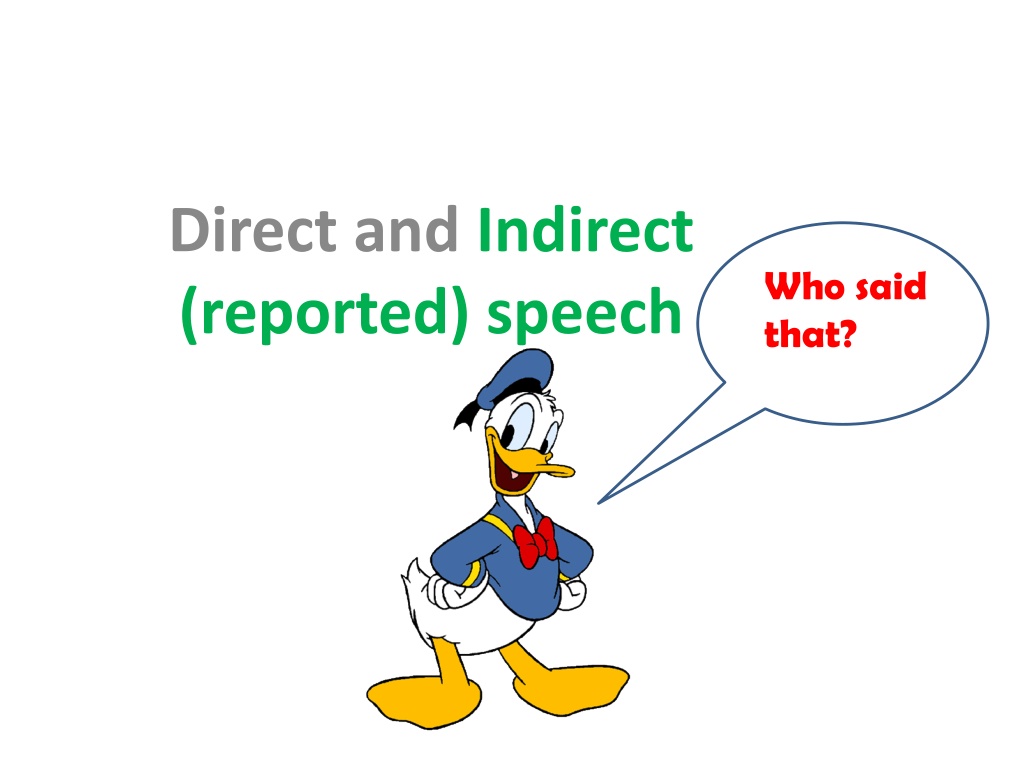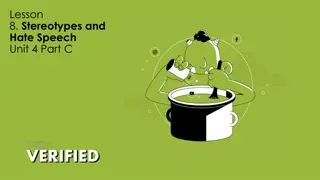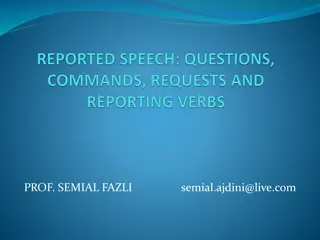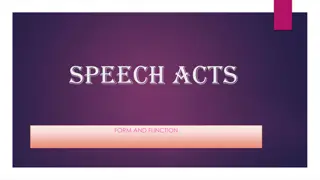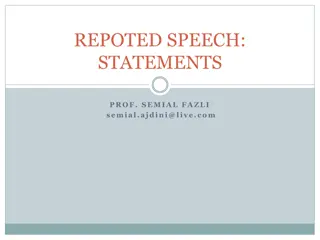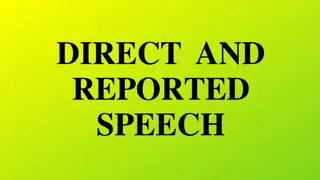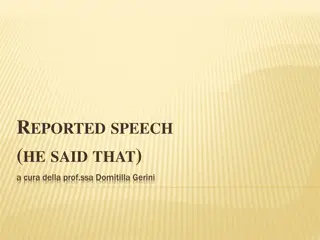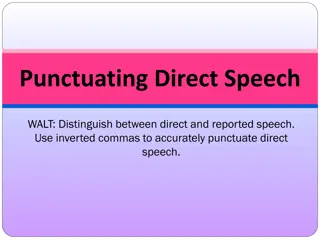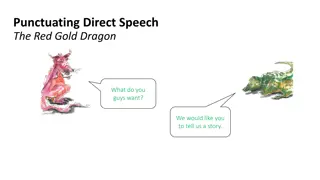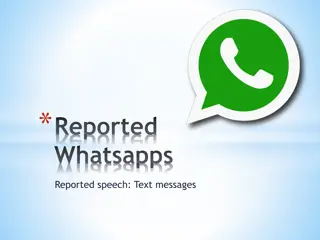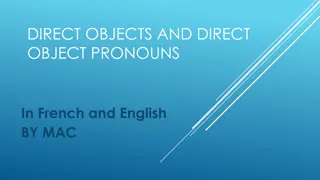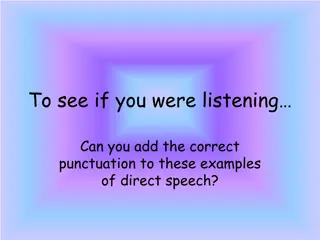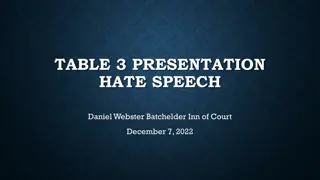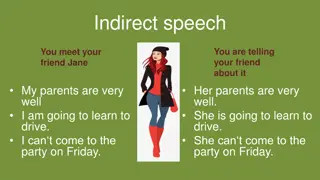Understanding Direct and Reported Speech in English
Explore the differences between direct and reported speech, learn how to convert direct speech into reported speech, and understand when to use each form in writing. Direct speech uses the speaker's actual words in quotes, while reported speech conveys the gist of what was said without using exact words. Enhance your storytelling by mastering the use of direct and reported speech techniques.
Download Presentation

Please find below an Image/Link to download the presentation.
The content on the website is provided AS IS for your information and personal use only. It may not be sold, licensed, or shared on other websites without obtaining consent from the author. Download presentation by click this link. If you encounter any issues during the download, it is possible that the publisher has removed the file from their server.
E N D
Presentation Transcript
Direct and Indirect (reported) speech Who said that?
Talking about talking and writing about talking To tell our audience or readers that someone said something, we have to give this information: who said it; what they said; and sometimes how they spoke or what they were doing at the time ( said is dead remember)
There are two ways to do it Direct speech and reported speech Skill: I can use direct and reported speech Success criteria: I know the difference between direct speech and reported speech; I can convert direct speech into reported speech; I can reconstruct direct speech from reported speech.
Whats the difference? Direct speech We usually use it in telling a straightforward narrative (story). Direct speech uses the speaker s actual words: What he or she said is what you write... inside speech marks of course. Reported speech We usually use it if we don t want or need to say the person s exact words. It can sound a little more formal. It s less immediate, but it can still be useful in telling a story. It can make a change from dialogue.
Direct speech uses: Speech marks, also called inverted commas the person s actual words In dialogue, use New Speaker, New Line Narration about who said it can go before, after or amongstthe speaker s actual words.
Direct speech uses: Speech marks or inverted commas Examples: John said, I m late. I m late, John gasped. I m late, gasped John.
When we write direct speech: In dialogue: remember New Speaker New Line Example: I m late, gasped John. New line Don t worry, Evie reassured him. We ll be in plenty of time for the bus. New line Are you sure? John muttered anxiously. How do we know who says We ll be in plenty of time for the bus ?
When we write direct speech: Narration about who said it can go before, after or in amongst (between) the speaker s actual words. Examples before: John said, I m late. After: I m late, John gasped. I m late, gasped John. Between/amongst: Oh no, gasped John, I m going to be late. Don t worry, Evie reassured him. We ll be in plenty of time for the bus.
Reported speech doesn t use speech marks changes pronouns (he/she/they/him/her) and often also changes word order adjusts verb tenses (and time phrases if necessary) usually starts by telling you who spoke often uses that - but you can omit it sometimes changes the verb too.
Reported speech: Doesn t use speech marks. John said He was going to be late. Who is he talking about? John said he was going to be late. Who is John talking about now? I mlate, said John. John said he was late. Am I late? John wondered. John wondered whether he was late. Changes pronouns. Often changes word order.
Reported speech adjusts verb tenses I m(present tense) late, John muttered anxiously. John muttered anxiously that he was(past tense) late. We llbe in plenty of time for the bus, Evie reassured him. Evie reassured him that they would be in plenty of time for the bus. I missedthe bus yesterday, John admitted. John admitted that he had missed the bus the day before.
Reported speech adjusts time phrases I missed the bus yesterday, John admitted. John admitted that he had missed the bus the day before. We re going to see our grandad tomorrow, Hassan reminded them. Hassan reminded them that they were going to see their grandad the next day. Katie announced: I m leaving this afternoon. Katie announced that she would be leaving that afternoon.
Reported speech usually uses that but you can omit it I m going to be late, John said. John said that he was going to be late. I m going to be late, John said. John said he was going to be late. OR: Which do you prefer?
Reported speech sometimes changes the verb too I m going to be late, John muttered anxiously. You could say: John worried that he was going to be late. Hey, Femi, look at this lemon-squeezer I ve found, Edward called excitedly. You could say: Edward excitedly showed Femi the lemon-squeezer he had found. Sorry I m late, gasped John. You could say: John apologised for being late.
Key Prompts 1. No speech marks 2. Who is speaking? 3. Using that 4. Pronouns and word order 5. Verb tenses Together Lets change this sentence of direct speech into reported speech. I am going to ride my bike later, announced Paul.
Key Prompts 1. No speech marks 2. Who is speaking? 3. Using that 4. Pronouns and word order 5. Verb tenses Together Lets change this sentence of direct speech into reported speech. Katie exclaimed, My dog Lucy has just had puppies!
Key Prompts 1. No speech marks 2. Who is speaking? 3. Using that 4. Pronouns and word order 5. Verb tenses Together 6. Connective? Lets change this sentence of direct speech into reported speech. Sometimes you might need to add a connective so that the sentence makes sense. Make sure you put on suncream, Tim, called out Mum, It s a hot day.
Key Prompts 1. No speech marks 2. Who is speaking? 3. Using that 4. Pronouns and word order 5. Verb tenses Your turn 6. Connective? Can you change this sentence of direct speech into reported speech? Dad, asked Hassan, What is that big box for?
Key Prompts 1. No speech marks 2. Who is speaking? 3. Using that 4. Pronouns and word order 5. Verb tenses Your turn 6. Connective? Can you change this sentence of direct speech into reported speech? I will pay you back next week, Bethany, Adam promised.
Key Prompts 1. No speech marks 2. Who is speaking? 3. Using that 4. Pronouns and word order 5. Verb tenses Your turn 6. Connective? 7. Different verb? Can you change this sentence of direct speech into reported speech? Sometimes you need a different verb. See this, Aysha? Olivia calledproudly, It s the birthday present my grandma gave me.
